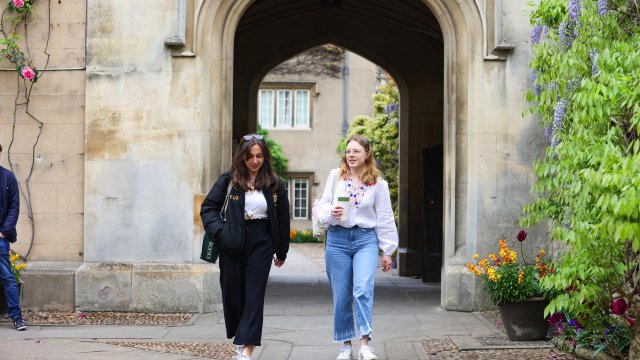Land Economy considers the role and use of land, real estate, and environment within an economy. It applies the disciplines of economics, law, and planning for the analysis of of land use, urban areas and interactions with other environmental resources.
Important Note Concerning Interviews for 2024
Please note, all undergraduate admissions interviews at Sidney Sussex for the 2024-25 admissions round will be held online. Further details regarding interview platform will follow.
The Land Economy course encourages students to develop an understanding of complex economic, political and administrative questions. The development of an analytical capacity to tackle complex questions such as “How should private development objectives be balanced against the need to conserve social assets?” and “In poor countries, what should governments do in the face of an explosive growth of urban areas and rural depopulation?” provides a stimulating education. The emphasis on the interaction of the private and public sectors fits students, after graduation, to enter either sector. The employment prospects of graduates in Land Economy are excellent, particularly in occupations dealing with land management, surveying, planning and development.
Undergraduate Study
The undergraduate degree in Land Economy offers students the opportunity to build valuable skill sets, study some of the key issues of our time, and cultivate excellent career opportunities. If you are looking for a degree that will give you an intellectual challenge and a wide breadth of career opportunities, this is it.
Law, economics and their relationship to the built and natural environment are at the heart of this course. In addition to these core areas, the issues studied on the degree have real-world applications and international scope. As you discover your areas of interest, you will also have the chance to explore real-world issues like:
- Environmental protection
- City Planning
- The principles of business regulation
- The financial aspects of real estate
- International development
- Financial regulation
- Principles of public and private institutions
- Mechanisms of the European Union
- Written work
We will not ask you to submit any written work as part of your application.
- Admissions assessments
There will be no admissions assessment for this subject at Sidney Sussex College.
- Interviews
- All undergraduate admissions interviews at Sidney Sussex for the 2024-25 admissions round will be held online. Further details regarding interview platform will follow.
- Two interviews, discussing questions related to Land Economy. One interview will involve discussion of a passage given to candidates to read beforehand.
- Subject requirements
- Learn about our standard entry requirements for Land Economy on the University website.
- Please note that offers are set on an individual basis using all of the information available to us in context of the entire field of applicants.
- Beyond the syllabus
Are you excited to learn more about the subject by delving beyond the school syllabus? Explore our Beyond the syllabus resource hub to discover interesting websites, podcasts, videos, and books related to the subject you love!
Typical intake
2 - 3
Typical A-level offer
A*AA
Typical IB offer
41-42 points overall, with 776 at Higher Level
Postgraduate Study
At the University of Cambridge applications for postgraduate study are processed centrally by the Postgraduate Admissions Office. The application form and supporting documents are submitted electronically via their website and the online self-service system, though academic decisions on applications are made by the Faculty.
- Funding
There are many funding opportunities at Cambridge from a wide variety of sources including the Cambridge Trust, Gates Cambridge, Colleges, Departments, Research Councils and central University funds. You can use the Postgraduate Admissions' Cambridge Funding Search to find out which type of funding you might be eligible for, and how and when to apply. They also operate a Postgraduate Funding Competition to co-ordinate some of these funding opportunities and make the process easier for you as an applicant.
To find information about the funds available for postgraduate students at Sidney, visit our Studentships and funding page.
- Useful links
Course directory | Postgraduate Admissions | University of Cambridge
Funding | Postgraduate Admissions | University of Cambridge
How do I apply? | Postgraduate Admissions | University of Cambridge
International students | Postgraduate Admissions | University of Cambridge
Opportunities to work, travel, and study
Graduates of the Land Economy Department have a wealth of career opportunities including the law, business and finance, civil service, public service, property professions, environmental agencies, further study and national/international agencies. The courses offer full or partial exemption from the requirements of a number of professional bodies, including the Law Society, Bar Council and Royal Institution of Chartered Surveyors.
Contact with the Department does not cease on graduation. The Cambridge University Land Society (CULS) is the oldest, largest and most active Departmental Alumni Society in the University and has almost 1,000 members, all alumni of the University of Cambridge working in property, be they surveyors, architects, lawyers or working in the finance and investment sectors, and including some influential players.
Discover more on our Opportunities to work, travel, and study page.


